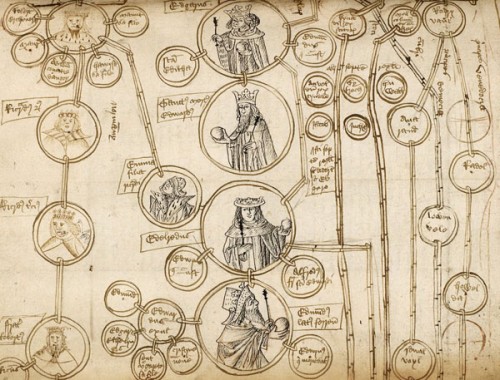Each Thursday, I’ll be stringing together some of the disconnected thoughts I’ve had about the subject of my dissertation in a feature I call “Thesis Thursday“. This week had two Thursdays, as last week I took a bye, so enjoy the second post of the week:

There is one loose thread from my last post that I want to circle back and pick up before moving on. ((Don’t worry, I’m tying one end of the thread here to this post, so if we get lost all we have to do is follow it back. Though if we run into a minotaur, things might get dicey.)) I said before that Geoffrey fashioned his King Constantine, the father of Uther and grandfather of Arthur, out of details from two different historical Constantines, 1) Constantine III, the Roman soldier stationed in Britain at the beginning of the fifth century who briefly usurped the imperial seat, and 2) Constantine of Cornwall, a descendant of Conan Meriadoc, the legendary British founder of Brittany. I also said that the usual read on Geoffrey’s composite Constantine is either confusion or conflation, but that I prefer to see the hand of Geoffrey the artist at work instead. Out of the fragments of historical information available to him, Geoffrey purposely selected details that would further the story he was telling and help him more fully integrate Arthur into the grand story of Britain itself.
While I certainly think that Geoffrey was a self-aware artist who knew exactly what he was up to a lot of the time, I worry that my lionizing might make him out to be too much of a maverick, too much the genius unappreciated for centuries until my heroic critical eye turned his way. A corrective to our denigration of Geoffrey is overdue, yes, ((Though nobody tell Valerie Flint I said that. Or Patricia Ingham. Or Laurie Finke and Marty Schictman. Or any of the other scholars I’m conveniently forgetting who do take a kinder view of Mr. Monmouth, of. In fact, best case, my dissertation will end up as a corrective to their correctives.)) but I don’t want to swing the pendulum back too far in the other direction, either. Rather, I think Geoffrey was more similar to his contemporary historians than most would like to believe. Surely, he was more successful than the lot and more ambitious, but Geoffrey was nevertheless using the same toolset as his rivals, just using it with more style.
Recall old William of Newburgh, who so famously lambasted Geoffrey’s Historia in the preface to his own History of English Affairs, pitting a genealogy of Anglo-Saxon kings he claimed was derived from the testimony of Bede against Geoffrey’s fabricated British. As I said when I discussed it before, we tend to overlook the fact that William’s list, too, is inaccurate, tweaked to make the case against Geoffrey. But even those who might quibble with my claim would easily admit that William did make one big mistake in his takedown of Geoffrey. His explanation of Geoffrey’s name is simply off. William writes:
For the purpose of washing out those stains from the character of the Britons, a writer in our times has started up and invented the most ridiculous fictions concerning them, and with unblushing effrontery, extols them far above the Macedonians and Romans. He is called Geoffrey, surnamed Arthur, from having given in a Latin version the fabulous exploits of Arthur, drawn from the traditional fictions of the Britons, with additions of his own, and endeavored to dignify them with the name of authentic history.
As his signatures on those Oxford charters reveal, Geoffrey was going by the name Geoffrey Arthur well before he ever started work on the Latin version of Arthur’s fabulous exploits, so William has his chicken and egg reversed. Of course, we don’t expect him to have gotten this fact right. William was likely but a babe in his cradle when the Historiawas first circulated and Geoffrey long dead by the time William took up the pen, so they could never have been properly introduced. Even had their lives overlapped more, William was writing all the way up in Yorkshire, while Geoffrey was an Oxford man. So William can be forgiven for not knowing the precise etymology of Geoffrey’s surname. Time and space conspired to keep it from him.

I would pay good money if someone would make a 2D fighting game featuring 12th-century historians. Fear William of Newburgh's vampiric might!
But perhaps we might consider instead that by playing around with Geoffrey’s name, William was up to something himself. While it’s certainly possible this historian we laud for careful attention to sources merely lifted his information from a faulty intermediary source now lost to us, it might also be the case that William had no source for this fact, at least no charter or “certain very ancient book” that laid it out incorrectly for him. And what is a historian to do when his sources fail to divulge pertinent information?
The answer we usually give, at least when the historian in question is Geoffrey, is that he just makes it up. But for someone truly committed to fabrication out of whole cloth, Geoffrey didn’t produce a work free of gaps and lapses. A scholar once said of Geoffrey, “Precision is the hallmark of the consummate forger”, which is a good line, I’ll admit, but one that conveniently ignores the places where Geoffrey isn’t precise, even when precision would have better made his point. ((Soon, I’ll go into the gaps and lapses Geoffrey left even in Uther’s story.)) Geoffrey seems to have felt constrained by something, for even he was unwilling to tell the kinds of lies that would’ve made his history complete and seamless.
As strange as it might be to say it about a man willing to just bold-facedly claim that he’d gotten everything from “certain very ancient book in the British language” that no one else would ever get to see, I think Geoffrey was still constrained by his sources and lack thereof, just as we imagine William of Newburgh and other more reputable historians were. But in the case of Geoffrey’s conflated Constantine and Newburgh’s faulty explanation of Geoffrey’s surname, each was actually working with accepted historical sources–just not ones we might today consider acceptable.
[CONTINUED ON PAGE 2]